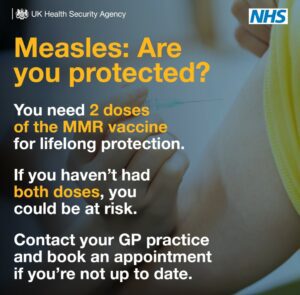
Dr Sam Ghebrehewet, Deputy Director at UKHSA North West
With measles cases starting to rise, parents in Cheshire and Merseyside must make sure their children are up to date with their immunisations. Dr Sam Ghebrehewet, Deputy Director at UKHSA North West, explains why vaccines are our best line of defence…
Many people believe that measles is a thing of the past. And it was back in 2016 when the UK had eliminated this highly infectious viral illness.
But since 2022, measles has been on the increase globally. We have started to see more cases across England, and indeed, in the North West, which is concerning.
While most people who catch measles will recover within a couple of weeks, it’s important to remember that it can be a very serious illness which can lead to pneumonia, meningitis, and on rare occasions, long-term disability and even death.
We’re advising people to be aware of the symptoms of measles which include a high fever, sore red watery eyes or conjunctivitis, tiredness, coughing, aches and pains and a blotchy red brown rash.
Complications of measles can develop in vulnerable people including, babies under one year old, children with a poor diet or weakened immune system, teenagers, adults and pregnant women.
Measles is one of the world’s most contagious infectious diseases known to man. It can be transmitted to others in the droplets of coughs or sneezes and can spread rapidly among communities if people have not been fully immunised.
It is particularly easy to catch in environments when in close contact with others so anyone with symptoms is advised to stay at home and phone their GP or NHS 111 for advice, before visiting the surgery or A&E, to prevent the illness spreading further.
 Our best line of defence against illnesses like measles are to take up the routine vaccinations which are offered for free on the NHS to all babies and children in the UK. This will give them the best start in life by protecting them from preventable illnesses at the earliest possible age.
Our best line of defence against illnesses like measles are to take up the routine vaccinations which are offered for free on the NHS to all babies and children in the UK. This will give them the best start in life by protecting them from preventable illnesses at the earliest possible age.
The MMR vaccine is a safe and effective way of protecting against measles, as well as mumps and rubella. Children are offered the first dose of the MMR vaccine when they turn one and the second dose at three years and four months.
We are urging parents of young children, teenagers and adults to check that they are up to date with their MMR vaccines, particularly before they travel this summer and before attending summer festivals where measles can spread more easily.
Our advice to parents and guardians is to check your child’s red book or speak to your GP practice who can check their records. And don’t worry if they have missed any – it’s never too late to catch up and your GP can arrange any vaccinations they’ve missed.
During the COVID-19 pandemic, we saw a fall in uptake of routine childhood vaccinations including MMR which leaves us vulnerable to outbreaks, especially as people travel abroad for summer holidays to places where measles is more common.
Uptake for the first dose of the MMR vaccine in two-year-olds in England is 89%, and uptake of two MMR doses at age five years is 85%, well below the 95% target set by the World Health Organization (WHO) which is necessary to achieve and maintain elimination.
In the North West, uptake of both doses of the vaccine by age five was below 90% in more than half of local authorities in the region and less than 80% in some areas.
Measles is now circulating in many countries around the world and the WHO has warned that Europe is likely to see a resurgence unless countries catch-up children who missed out.
Healthcare professionals have been alerted to the recent rise in cases and asked to be vigilant to further cases whilst also working with communities to increase vaccination uptake.
It’s important to remember that measles is not just a childhood illness and can be more severe in young people and adults, often leading to hospital admissions. So, adults need to check their vaccination status too. There is no upper age limit to offering MMR vaccine.
Protect you and your family today by making sure you’ve all had your MMR jabs.
For further information about measles, go to: https://www.nhs.uk/conditions/measles/
Information about the MMR vaccine can be found by visiting: https://www.nhs.uk/conditions/vaccinations/mmr-vaccine/